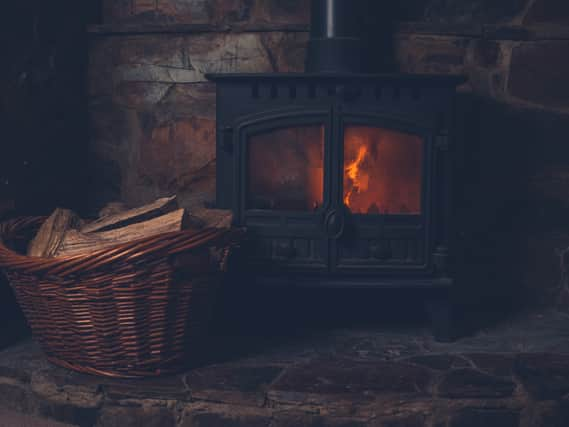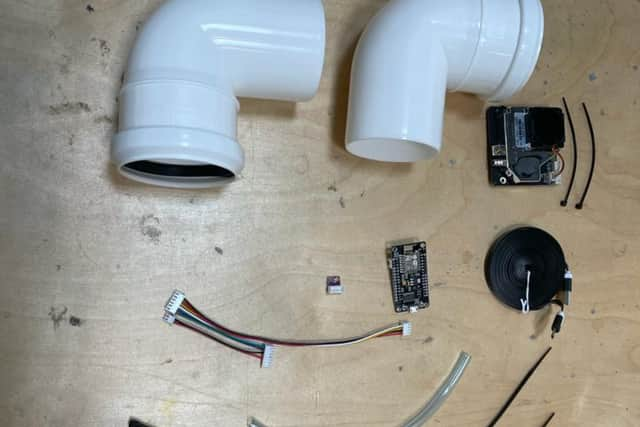Log burners in Bristol: Pollution monitoring begins amid calls for a ban


Smoke from log burners in a central part of Bristol is being monitored to discover how much dangerous soot is being pumped out into the atmosphere.
Volunteers from Ashley ward have come forward to learn how to assemble and install their own monitoring devices, which will collect real-time data for analysis by experts.
Advertisement
Hide AdAdvertisement
Hide AdThe project, which will run over the autumn and winter, comes amid growing fears for residents’ health with the onset of winter and an expected rise in the use of wood and coal-burning stoves.
Log burners have become increasingly fashionable and are common in many of Bristol’s refurbished Victorian homes, especially in the central parts of the city.
But they produce very fine soot particles, known as PM2.5, which have been identified by the World Health Organisation as the most serious air pollutant for human health.
The tiny particles enter the bloodstream and lodge in the lungs and other organs, and are especially dangerous for asthmatics and people with lung conditions, putting them at risk of potentially life-threatening asthma attacks or flare ups.
Advertisement
Hide AdAdvertisement
Hide AdIn an attempt to get a better understanding of how much pollution comes from people using stoves to burn wood and coal at home, the project in Ashley ward – a collaboration between Bristol City Council, the Knowle West Media Centre and the University of the West of England (UWE) – is recruiting volunteers to monitor air quality outside their homes.


Ashley ward takes in Montpelier, St Pauls and St Werberghs, and covers an area bounded by the A38, the Bearpit and the start of the M32 which lies just outside the proposed Clean Air Zone due to be introduced next year.
So far, 11 residents have attended workshops run by the Knowle West Media Centre where they were taught how to assemble their own monitoring devices, capture and understand air quality data.
They were given the parts to build the ‘Luftdaten’ sensors, which look like “a drainpipe with some bits sticking out”, according to a spokesperson for the centre.
Advertisement
Hide AdAdvertisement
Hide AdThe sensors measure PM2.5 and larger PM10 particles in real time, and residents install them outside their homes.
The air quality data is automatically sent to Bristol’s Open Data website, which contains data about a myriad of topics, as well as to the website of the global Sensor Community project which uses Luftdaten sensors to capture and records environmental information.
The Knowle West Media Centre plans to run more workshops for people interested in taking part in the project.


“We will explore people’s lived experiences of air quality and with the creative use of data and technology, we will look to find solutions which are people and issue led,” the spokesperson said.
Advertisement
Hide AdAdvertisement
Hide AdUWE is analysing the data from the Bristol project, as well as analysing responses to a public survey to understand why people use solid fuel, according to a spokesperson for the university.
“Our role is to bring these evidence streams together, along with an assessment of the overall project approach, to surmise the project findings and make recommendations for future work,” the spokesperson said.
The project is being funded by the council, using £122,000 allocated by Defra (the Department for Environment, Food & Rural Affairs) to tackle the problem of pollution from domestic stoves that burn wood or coal.
A council spokesperson said: “The project will run over the autumn and winter, aiming to increase our understanding of how citizens use solid fuels, make better estimates of the pollution from burning wood and coal, and raise awareness of the harmful pollution it creates.”
Advertisement
Hide AdAdvertisement
Hide AdBristol is covered by a ‘smoke control order’, but log burners and stoves are legal to use as long as they or the fuel they burn are on an approved government list.
There are growing calls for log burners to be banned, and Bristol City Council is among local authorities calling for greater powers to deal with the problem.
A council spokesperson said: “Fine soot from wood-burning stoves is contributing to the problems with air quality.
“We continue to support the calls to national government to make powers available to councils which would allow further action on the issue and have backed the tougher pollution targets and £1.5bn air pollution fund called for by the UK100.”
Advertisement
Hide AdAdvertisement
Hide AdUK100 is a network of local government leaders seeking ways to transition to clean energy that are “ambitious, cost effective and take the public and business with them”, according to the group’s website.
Comment Guidelines
National World encourages reader discussion on our stories. User feedback, insights and back-and-forth exchanges add a rich layer of context to reporting. Please review our Community Guidelines before commenting.